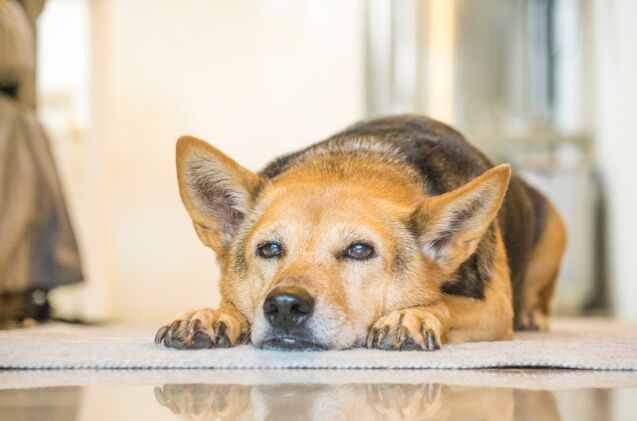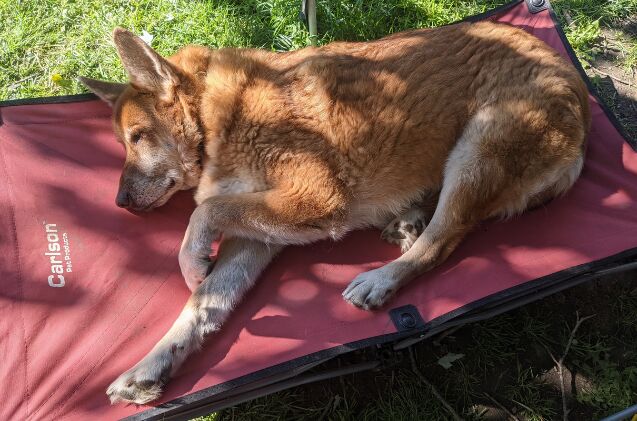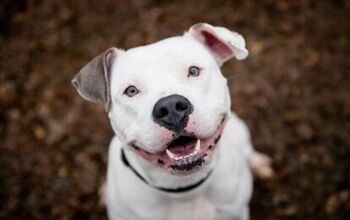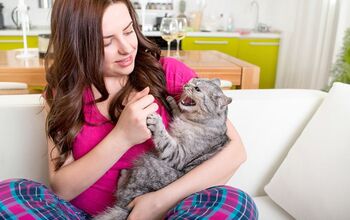Why is My Senior Dog Restless at Night?


As our loving pups get older, they may face physical, mental, and emotional challenges. One common issue that dog parents often experience with their aging pups is nighttime anxiety. This refers to the inability to settle in and sleep throughout the night, including pacing, whining, or appearing restless.
If you’re currently struggling with this situation, you already know how much it can impact not only your dog’s sleep but also your own!
In this article, we will break down the most common reasons why your senior dog is restless at night. We’ll also discuss how you can address this situation, encouraging your dog to relax and enjoy a full night of sleep – ultimately improving their overall health and well-being. Let’s get started…
Why Won’t My Senior Dog Settle at Night?
Nighttime anxiety and disturbances may have several different explanations. This is why you need to work with your veterinarian to assess the situation, identify clues, and reach a diagnosis. Here are a few of the more common reasons for nighttime anxiety.
Pain or Arthritis
One of the most common physical ailments that older dogs will face is the onset of arthritis. Our dogs are masters of hiding their pain, but that doesn’t mean that they aren’t experiencing discomfort. Identifying pain may be a little easier if your dog has recently suffered an injury. However, conditions like arthritis tend to creep in at a slower rate, remaining unnoticed until they progress to the point of disrupting your dog’s routine.
Some signs your dog is experiencing pain include:
- Dilated pupils or squinted eyes
- Facial grimacing
- Tail tucked between their hind legs
- Hiding or avoiding everyday interactions
- Loss of appetite
- Reluctance to be touched or held
- Uncharacteristic signs of aggression or reactivity
- Loss of interest in playing
- Slowing down or moving in a stiff or uncomfortable manner
- Hunched body position
- Limping or favoring a leg
- Sharking or trembling
- Difficulty lying down or getting back up to their feet
- Struggling to navigate stairs or raised objects like the couch/bed
- Vocalizing discomfort (whimpering, howling, groaning, whining)
Easing your dog’s pain may provide just the relief they need to sleep comfortably once again. Talk to your vet about your concerns and any signs you may have noticed. This will open the door to discussing pain management options.
Canine Cognitive Dysfunction
Just as people may struggle with dementia and their mental faculties, so too can our senior dogs. If your dog has been suffering from canine cognitive dysfunction (CCD), they may be experiencing a disruption in their sleep/wake cycle. This means their mind no longer settles into their previous routine, in which the brain knew to rest and slow down at night. CCD can also cause confusion or disorientation, leaving them feeling anxious and unsettled.
Common warning signs of CCD in your dog include:
- No longer showing a desire to play
- “Accidents” in the home
- Pacing (especially at night)
- Vocalizing at night (whining, grumbling, barking)
- Loss of appetite
- Excessive licking
- Failure to keep up with their self-grooming
- Staring at walls or corners
- Getting stuck behind or beside objects, including those that have been in that location for a long time
- Failing to adhere to previously trained obedience or rules
- No longer recognizing people or pets
- Irritability
There is no treatment for CCD. However, your veterinarian can help you manage your dog’s condition and provide them with a good quality of life. Keep an eye on your dog and discuss any changes with your vet as the condition progresses. There are medications available that may help to slow the effects of CCD and calm your senior dog, allowing them to enjoy a good night’s sleep.
Other Medical Conditions
Several other medical explanations exist for why your senior dog is having difficulty getting settled and staying rested throughout the night. Many of these conditions are responsible for pain or discomfort. Think back to the last time you weren’t feeling well – we often struggle with getting comfortable too!
Take a moment to observe your dog in their daily routine. Are you noticing any changes to their behaviors or actions? Even the slightest change to how your dog carries themselves through the day could indicate something is wrong. This could include changes to how your dog eats, whether they are drinking more or less than usual, or minor changes to their daily habits and household manners. Write down any changes you notice, no matter how small they seem, and bring this list to your dog’s next vet appointment.
Here are some conditions your vet may test for that could explain nighttime anxiety:
- Diabetes
- Urinary tract infections
- Hypertension
- Hypothyroidism
- Cushing’s disease
- Kidney disease
- Intracranial disease
How Can I Help My Restless Senior Dog Sleep?
Now that you better understand why your senior dog is restless at night, you can address the challenges preventing them from sleeping. Not only will this improve your dog’s sleep, but it will also allow you to sleep comfortably without being repeatedly awoken. This is important for everyone’s quality of life!
Discuss Options with Your Veterinarian
After your vet has run the tests necessary to determine the cause of your dog’s nighttime anxiety, it’s time to discuss the available treatment options. If pain is keeping your dog awake, they may be able to offer pain management solutions. Changes to your dog’s diet or daily routine may also help to address specific medical concerns.
Consider Natural Supplements
If you prefer addressing your dog’s health and well-being with a natural approach, there are many products that you may wish to consider. For dogs struggling with stress and anxiety, you can help ease this struggle with calming supplements like the melatonin in Native Pet Calm. Another natural solution to anxiety and stress would be to use a ThunderEase Dog Calming Pheromone Diffuser Kit.
On the other hand, joint aches and pains can be addressed with a mobility supplement like Glucosamine, Chondroitin, Turmeric, or Green-Lipped Mussel. Many joint supplements formulated with aging dogs in mind, like the Zesty Paws Senior Advanced Mobility Bites, will combine several of these solutions in a single treat-like chew.
Try Alternative Treatment Options
There have been many significant discoveries and innovations in the treatment of aches and pains from conditions like arthritis. Some options that have shown great promise include acupuncture and cold laser therapy. If you want more information about these solutions and whether they are a good fit for your older dog, talk to your veterinarian.
Create a More Comfortable Sleeping Location
Your dog’s bed can significantly impact their ability to sleep through the night, especially if there are aches and pains to consider. Orthopedic dog beds feature memory foam for a more comfortable surface for dogs of all ages. Introducing an elevated bed makes it easier for your senior dog to get in and out of bed without any unnecessary struggles.
In addition to the surface your dog is sleeping on, you should also note where the bed is set up in your home. If they are experiencing feelings of stress and anxiety, being separated from you could worsen those feelings. Setting up your dog’s bed near your own may give them the sense of safety and security they need to settle in a little easier at night.
Introduce More Mental and Physical Enrichment
As the old saying goes, “A tired dog is a happy dog.” Of course, as your dog gets older, they may have a harder time maintaining the same level of physical exercise. But this doesn’t mean they don’t need a positive outlet for any energy they feel. The best way to address this need is to consider opportunities for mental enrichment. In fact, mental stimulation can wear a dog of any age out faster than physical stimulation. It also offers the benefit of helping to slow or prevent the cognitive impact of aging.
Rather than feeding your dog like usual, consider introducing a lick mat or food puzzle. These products tap into your dog’s natural desire to forage while requiring them to work for their food. You can even take this a step further for dogs that need a more significant challenge and freeze your dog’s food in a puzzle with dog-friendly broth.
Another great way to incorporate more mental stimulation into your dog’s daily routine is to engage in daily training exercises. Even an older dog can pick up new tricks if you are willing to put in the time and effort. Just know that they may take a little longer to pick it up. Keep it fun and upbeat by choosing entertaining tricks like “high-five,” showing your dog how to pick up their toys, or teaching your dog to paint.
Set the Mood
In addition to your dog’s bed, you can help to set the mood for a night of better sleep by thinking through some of the minor details of your dog’s space. Soothing music can help to ease stress and anxiety, helping them settle in for the night. Studies have found that classical music has the greatest calming effect.
Is your dog’s vision starting to decline? If so, the inability to see what is happening around them can add to the stress they experience while trying to settle in for the night. Night vision is often one of the first changes that older dogs experience in relation to their eyesight. You can ease any anxiety from being unable to see their surroundings by including a nightlight in the room near your dog’s bed.

Our Go-To Solution: Carlson Pet Products Portable Pup Travel Pet Bed
Earlier this year, my sweet senior girl Daviana turned 15 years old. This is a welcome milestone for a larger dog like her, a German Shepherd mix. She is still sharp and full of life. However, she has started to show her age in little ways in recent years. This includes moving a little slower, stiffness from arthritis that has set in on her lower back, and a noticeable struggle to get comfortable and sleep through the night.
After working with our veterinarian to do some testing and better understand her situation, it was determined that she is not yet experiencing any cognitive issues – but her arthritis makes it difficult for her to get comfortable on many common surfaces. This includes the basic style of dog bed she had used most of her life.
By introducing an elevated bed into her daily routine, we eliminated the need for her to get down onto the ground (or back up off it again when she wakes up). The bed also offered a comfortable surface to sleep on that didn’t put unnecessary pressure on her aging joints.
We chose the Carlson Pet Products Portable Pup Travel Pet Bed for its ability to easily fold up and travel wherever life takes us. We paired her elevated bed with a cushy orthopedic dog bed in the house for even greater comfort. When relaxing outside in our backyard, the bed can be set up wherever she prefers to sleep, and it’s easy to clean it off before bringing it back indoors. It also travels with us on our many adventures camping with our dogs.
Pros
- Portable design and carry case make it easy to bring your dog’s bed anywhere you travel
- Elevated bed makes it easier for dogs with arthritis to get in and out of bed
- Waterproof nylon surface is easy to clean by just rinsing it off or wiping it down
Cons
- Doesn’t offer any additional padding, blankets/mats need to be purchased separately
- The rivets in the bed framing did give out from regular use but were easily replaced with a screen and locking nut
- Bed is not chew resistant
Final Thoughts
There are many reasons why your senior dog may be restless, pacing, and struggling to sleep through the night. The most common reason at this age is cognitive dysfunction, or “doggy dementia.” While it can be challenging to watch your best friend go through this struggle, there are steps that you can take to manage the situation and give them the best possible quality of life. This includes offering an elevated bed to take any pressure off their joints for a comfortable night’s sleep. Your senior pup will thank you for it!

Britt Kascjak is a proud pet mom, sharing her heart (and her home) with her “pack” which includes her husband John, their 3 dogs – Daviana, Indiana, and Lucifer – and their 2 cats – Pippen and Jinx. She has been active in the animal rescue community for over 15 years, volunteering, fostering and advocating for organizations across Canada and the US. In her free time, she enjoys traveling around the country camping, hiking, and canoeing with her pets.
More by Britt












![Easy-To-Understand Cartoon On How A Dog’s Nose Can “See” [Video]](https://cdn-fastly.petguide.com/media/2022/02/28/8266723/easy-to-understand-cartoon-on-how-a-dogs-nose-can-see-video.jpg?size=350x220)






